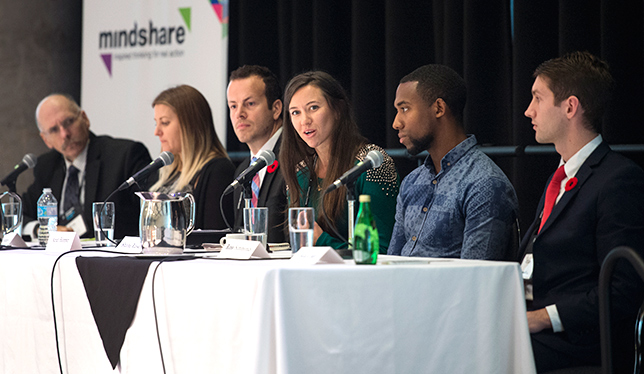Talented graduates need more reasons to stay in Atlantic Canada, said Dino Trevisani, president of IBM Canada, in a keynote address at an event in Halifax hosted by Universities Canada. At the November 7 Mindshare event, “Inspired thinking on entrepreneurship,” Mr. Trevisani launched the day’s discussions with a call for businesses, government and the university sector to work together to provide more opportunities for young Atlantic Canadians.
Citing a statistic from the economic development group Halifax Partnership, Mr. Trevisani said that 1,300 young people between the ages of 20 to 29 leave Nova Scotia every year. If they had better access to early career opportunities, he said, they might stay.
When businesses like IBM work closely with provincial government and universities, said Mr. Trevisani, they provide the technology, mentorship and training that can give young people the IT skills needed for tomorrow’s knowledge economy.
He cited IBM’s Client Innovation Centre in Nova Scotia and successful global security division in New Brunswick as examples. Partnerships with universities play an important role in building these hubs, he explained, because of the concentration of educated young people.
These centres provide hundreds of highly skilled jobs and help accelerate the transition to a strong knowledge-worker economy in Atlantic Canada, said Mr. Trevisani.
Following his remarks, a panel of five young Halifax entrepreneurs and business leaders addressed the question, “How can we empower young people to drive economic prosperity in Atlantic Canada?”

Ron Hanlon, the president and CEO of the Halifax Partnership, moderated the discussion focused on the panelists’ own experiences of living, working and growing their careers in Halifax. Many panelists shared their frustration with the pervasive negative perception of Atlantic Canada as a place of out-migration.
“People are always asking me why I stayed in Atlantic Canada. But areas for improvement in Atlantic Canada are actually opportunities – and that attracts a certain kind of person,” said Jenelle Sobey, the 30-year old managing partner of Norex.ca and graduate of the University of New Brunswick.
“There’s a lot of opportunity for young people in Atlantic Canada and we need to convey that story better,” agreed Ross Simmonds, a digital marketing strategist and the co-founder of Crate, a content-curation tool.
When asked about the role of universities in preparing young people for successful careers, many of the panelists cited their experience in co-ops and internships as directing them on a path to their career.
In his speech, Mr. Trevisani also called for co-ops and internships for 100 percent of postsecondary students, echoing the Business Higher Education Roundtable’s position on work-integrated learning.
Mr. Simmonds argued that more must be done to open these opportunities to a wider community. Universities need to do a better job of reaching out to minority groups, people of colour and indigenous students, he claimed, to make sure they know about and are welcomed to apply to career-enhancing opportunities like these.
The panel ended with a conversation about current trends in entrepreneurship. Sheena Russell, the co-founder of Made with Local, claimed that millennials want to start – and work for – businesses with a conscience. Young people want to have a positive impact on their communities, and they are looking for work that will help them do that.
For Ms. Russell, summer jobs in the agriculture industry during her environmental sciences degree at Dalhousie University got her thinking about local food systems. Made with Local now has two product lines made with Canadian ingredients that are produced by social enterprises in the community.
More and more, businesses are focusing on the triple bottom line of people, planet and profit, agreed Ms. Sobey.
During the closing question-and-answer period, UNB president Eddy Campbell noted how inspiring he found the panelists, and wondered whether they were representative of their generation. The answer from the panel was an unequivocal yes – and that the next generation of students and entrepreneurs will need support from government and employers to build businesses and careers that contribute to the health of their communities.
Mr. Trevisani’s speech and the following panel were part of Mindshare, a speaker series hosted by universities across Canada in 2016 designed to promote new thinking and provoke conversations on policy issues critical to Canada’s future. Keynote speaker Dino Trevisani’s remarks were live streamed and can be viewed online at facebook.com/univcanada.
For more information, visit www.univcan.ca/mindshare.